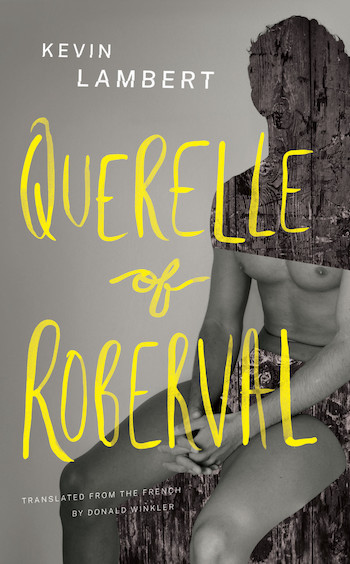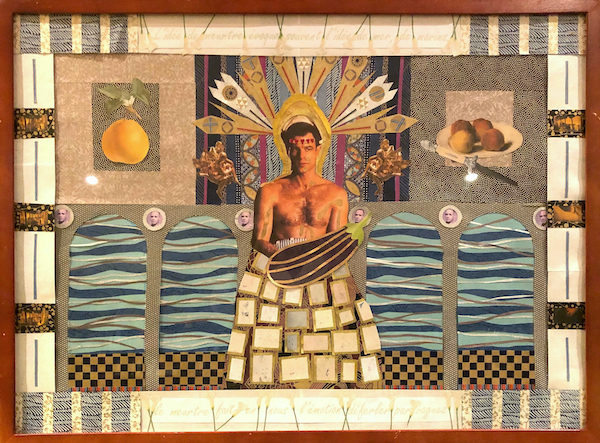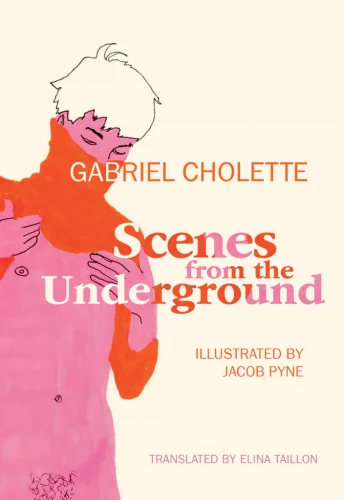Book Review: Three Splendid Volumes Filled with the Cool, the Wicked, and the Amazing
By Will Aitken
It’s hard to convey what a benison these books have been to me, as I’ve read them in my narrow, monkish bed late into the night.
Querelle of Roberval by Kevin Lambert (translated from the French by Donald Winkler), Biblioasis, 200 pages
Scenes from the Underground by Gabriel Cholette (translated by Elina Taillon). Illustrations by Jacob Pyne. House of Anansi Press, 168 pages
Cacaphonies: The Excremental Canon of French Literature by Annabel L. Kim, University of Minnesota Press, 289 pages

Writer Jean Genet –a tumescent Huck Finn.
Inter faeces et urinam nascimur [we are born between shit and piss]. (attributed to Saint Augustine of Hippo)
I first discovered the works of Jean Genet in 1964 at the back of the local pharmacy in a small, stifling Midwestern town. I was 15 and instantaneously aroused by the few pages I skimmed of Our Lady of the Flowers (1943), its cover shouting, “A SHATTERING NOVEL OF HUMAN DEPRAVITY.” I paid and rushed home.
I didn’t quite get it, couldn’t quite follow the story, was perplexed by floating personal pronouns that seemed to attach to characters willy-nilly, wasn’t yet sure (silly me) of what depravity had to do with the Catholic Church. On the other hand, Genet’s drag queens, pimps, whores, and horny prisoners — his whole glorious lumpenfag world — gave me a succession of riotous nights and hope for the future.
Long before it was called that, Genet ripped open what queer literature could say or gleefully describe in fulsome detail. He wrote the five novels that defined him between 1942 and 1947. A childhood theft had left him branded as evil and so he chose, like a tumescent Huck Finn (“All right then — I’ll go to hell”) to run with evil, rewrite it top to bottom, as it were, and construct an incandescently beautiful new world, with its own ineluctable, inverted logic of longing.
His books scandalized pearl-clutchers and book-banners on both sides of the Atlantic. This was a writer who transubstantiated farts into pearls: “If [Darling] says, ‘I’m dropping a pearl’, or ‘A pearl slipped,’ he means that he farted in a certain way, very softly’.” The emanation of that pearl “coils about him, haloes him head to foot.”
Genet was soon feted by both the great and the scandalized — he was such a handsome, rowdy, randy brute — and over the coming decades found himself the subject/object of two other French geniuses, Sartre and Derrida, who both wrote books about him, respectively sanctifying him in Saint-Genet (1952) and deconstructing him alongside Hegel in Glas (1974).
The elevation of disgust — self-disgust, disgust with others, disgust with the whole putain de merde cosmos itself — to a toxic virtue has a long tradition in French literature. A comic preoccupation with and a mirrored desire for minutely examining what others would turn away from with revulsion figure exuberantly in Rabelais’s Gargantua and Pantagruel (1534). The volume was so farcically disgusting that posterity named an adjective after him. As critic and novelist Lucy Ellmann notes, “he couldn’t get enough of arseholes,” or of what brownly slithered from them.
 In her splendid new book Cacaphonies: The Excremental Canon of French Literature, Harvard University professor Annabel L. Kim finds fecal eruptions in 20th- and 21st-century writing, and the disrelish they can cause in some readers as well as the joy, celebration, and even deliverance they bring to others. The first nostalgic memory of Ferdinand, the protagonist of Louis-Ferdinand’s scabrous Death on the Installment Plan (1937), is of his childhood self’s shit-covered bottom and “the smell rising up from the blocked latrines, overflowing with shit and yellow water, stir[ring] childhood memories which rise up like black soil mined by moles.” It would be easier to enumerate what didn’t disgust Céline than what did — his abhorrence for the world extended even to his own craft: “I don’t have any ideas! none! and I find nothing more vulgar, more common, more disgusting, than ideas! libraries are full of them!”
In her splendid new book Cacaphonies: The Excremental Canon of French Literature, Harvard University professor Annabel L. Kim finds fecal eruptions in 20th- and 21st-century writing, and the disrelish they can cause in some readers as well as the joy, celebration, and even deliverance they bring to others. The first nostalgic memory of Ferdinand, the protagonist of Louis-Ferdinand’s scabrous Death on the Installment Plan (1937), is of his childhood self’s shit-covered bottom and “the smell rising up from the blocked latrines, overflowing with shit and yellow water, stir[ring] childhood memories which rise up like black soil mined by moles.” It would be easier to enumerate what didn’t disgust Céline than what did — his abhorrence for the world extended even to his own craft: “I don’t have any ideas! none! and I find nothing more vulgar, more common, more disgusting, than ideas! libraries are full of them!”
Jean-Paul Sartre’s Nausea (1938) details the recurrent feelings of revulsion that wash over the young historian Roquentin as he contemplates his own nausea “spread at the bottom of the viscous puddle, at the bottom of our time … it is made of wide, soft instants, spreading at the edge like an oil stain.” In Memoirs of a Dutiful Daughter (1958), Simone de Beauvoir cast a cold eye on her dying mother’s bald pubis. Immediately turning away, she was “astonished at the violence of my distress.”
Margeurite Duras’s indelible The War: A Memoir (1985) focuses on her starving husband’s excretions when he returns from Dachau where, after the camp was liberated in 1945, friends from the Resistance discovered him in a pile of dead inmates. Duras, who helped nurse him back to health, gives extended descriptions of the 17-day period when he had six or seven shits per day: “Once he was sitting on his pail he excreted in one go, in one enormous astonishing gurgle … this dark, green, slimy, gushing thing.… It was inhuman.” As the images — the smells — become more detailed and precise, the realization comes that Duras writes not so much to disgust as to articulate the horror of war and death in both solid and liquid form: “After seventeen days, death grows weary … the pail doesn’t bubble any more … It’s still green but it smells more human, it smells human.” He had shat out evil, excreted death. To those who wince at such pungent descriptions, Duras is characteristically Duras: “I shit on them.”
One of my favorite French words is the adjective dégueulasse. In France it means what you’d expect it to mean: disgusting, repugnant, filthy. In Quebec it signifies all that but also cool, wicked, amazing.
Two irritatingly young queer writers — both Montrealers, both 29 — owe an enormous debt to Genet. The novel Querelle of Roberval: A Syndical Fiction by Kevin Lambert makes the connection clear, transporting Genet’s lubricious lyrical style and his immortal-till-he-dies murderous sailor Querelle (“the idea of murder often inspires the idea of the sea, of sailors”) to a small-town sawmill on the shores of a vast lake in northern Quebec.
The second book, Scenes from the Underground by Gabriel Cholette, presented as a dashed-off auto-fiction, leads us, much as Virgil led Dante, on a bracingly squalid tour of queer clubland in North America and Europe. Cholette says he hasn’t read Genet but has surely absorbed him by homo osmosis. Even the book’s illustrations, by Montreal artist Jacob Pine, appear to echo Cocteau’s drawings for the original, clandestinely published Querelle de Brest.
Lambert already cuts a dazzling swath across French literature at home and in France. His first novel, You Will Love What You Have Killed, was long-listed and Querelle de Roberval a finalist for France’s coveted Prix Medicis. His third novel, Que Notre Joie Demeure (May Our Joy Remain) was published in Quebec in September.
 There’s precious little shit in Querelle of Roberval despite a prodigious amount of bum-fucking. A cross between Paul Bunyan and a Tom of Finland centaur, Querelle comes from the fruitful fleshpots of Montreal but has washed up in the northern town of Roberval, “a dirty little muddle of bungalows and two-story commercial units that gnaw away at a portion of Lac Saint-Jean.”
There’s precious little shit in Querelle of Roberval despite a prodigious amount of bum-fucking. A cross between Paul Bunyan and a Tom of Finland centaur, Querelle comes from the fruitful fleshpots of Montreal but has washed up in the northern town of Roberval, “a dirty little muddle of bungalows and two-story commercial units that gnaw away at a portion of Lac Saint-Jean.”
He works stacking lumber at a sawmill on Chemin Saint-Hubert but the workers are on strike so he walks the gelid picket line above the “marmoreal” lake. As a new, openly gay arrival he’s a subject of fascination, terror, and envy for the hetero parents of the town — the fathers all too vividly imagine what Querelle may do to their comely adolescent sons, the mothers prod their boys in the lumberman’s direction, eager to protect them from their fathers’ incestuous dreams.
The sons, with their “delicate peach-skin” bodies, flock to Querelle because he adds excitement and meaning to their flat, pointless lives: “All those boys on bikes speeding through the night … who never wear helmets on the way to be defiled in their divine lover’s bed.” Querelle takes them serially as his due: “His hands hold them motionless in his bed, the long, hard shaft sunk in up to his balls, makes the soiled boys come, the scandalous spread-eagled boys, swallowers of his honeyed jism.”
If Querelle of Roberval were only this — skillfully managed Genet pastiche — it would make for wild satire of Quebec life in “the regions,” a semi-dismissive term used by Montrealers to paint the countryside insular, racist, and anti-immigrant, much like the current Quebec premier, François Legault, head of the appropriately named CAQ party (Coalition Avenir Québec). The good citizens of the regions know in their hearts that Montrealers are effeminate, idle and rich, clueless and terrifyingly multiethnic.
This blazingly ambitious book holds in its imaginative and stylistic grasp an ambrosial gay romance, a telling group portrait of workers and their boss locked in an increasingly brutal syndical struggle, a Greek tragedy that cascades from Prologue through to Exodos, a bold experiment in collective stream-of-consciousness, and a radical tract laying out why the rich should become comestible sooner rather than later.
The extended stream-of-consciousness passages sweep through the heads of everyone on the picket line, but there’s no guiding transition from voice to interior voice — little actual dialogue occurs in the book. A paragraph the begins in the mind of Querelle’s sole ally, the lesbian Amazon Jézebel, may end inside the thoughts of her sister Judith, the double agent who cozies up to the fatuous boss, and yet it’s never quite clear how we got there. This can make for acute disorientation but adds much in terms of texture and idiosyncratic voices, as the text swings from the high rapture of Querelle’s own interior monologues to the blunt and colorful French spoken in the Lac Saint-Jean region where the conventional word for cold, froid, becomes frette and the meaningless but emphatic la-là – literally ‘there, there’ — enlivens the end of every second sentence.
Querelle centers the novel in the way the town centers on him. In his mind and body promiscuity becomes generosity: “[He] always talks about his loves in the plural, the beauty of those countless boys who look alike and whose names he never remembers.” Not so much heartless as heedless he “embrac[es] a type whose perfect incarnation he still hopes to find by multiplying his encounters.” Like Aschenbach stalking the Venetian Lido, he yearns for the ideal, the platonic boy, “that impossible boy … incarnate at last in a perfect boy who would block out all the others and would obliterate Querelle at the same time.”
The longing for annihilation runs a deep seam through the narrative, the people of Roberval, like the rest of us, fighting an enemy they call le système — the superior forces ranged against them. In an interview in the French newspaper Libération, Lambert lists capitalism, neo-liberalism, and the fast-decaying state of the world, and adds “But how do you attack that? The enemy’s too big, too diffuse.” So the citizens attack what’s at hand: one another. Misogynist, homophobic, racist, and, in the preponderately white regions of Quebec, fearful of a newly arrived immigrant under every bed.
After the sawmill boss spikes the strikers’ morning coffee with Javex, sending several of them to hospital, after he hires a trio of drug-crazed teenage boy-furies with perpetual hard-ons to burn the strikers’ homes, after he locks them out (after one of their number has been driven to suicide), the workers are so filled with despair that, according to Lambert, it’s no longer enough to demonstrate. “They must perform it, direct it.” They explode.

Will Aitken’s collage homage to Fassbinder’s Querelle.
Like Genet, confronted with his childhood thievery, the workers finally embrace the label the boss and the companionate media have flung at them: radicals. If the boss wants radical, they’ll smash his face. The final pages of Querelle of Roberval revolve around a phantasmagorical clash of the titans on the high school soccer field, followed by an impromptu poolside barbecue at the boss’s house, with a guest appearance by Medea.
Too many young writers now ponder the current intractable state of things via fictions that either stew in dreams of a postapocalyptic near-future in wan and sickly prose or sink into a morass of passivity in some cod-Orwell dystopia. Lambert has the rage and temerity to discard these outcomes as obvious and self-placatory, to rebuke these scads of Cassandras whining, “See! We told you things were bad!”
Lambert’s vision is incendiary and deliberately, provocatively brutal. Revolutionary. His tacit argument that the rich are killing not only workers but, in the likely short run, everybody else as well. His conclusion’s there for all to see: the rich must be stopped by the performed revulsion and despair signified by an already flaming world.
Like Genet, under Sartre’s gaze, Lambert’s Querelle becomes a saint, a profane, priapic, and martyred one, perhaps now in a self-engendered paradise where he fulfills his furtive dreams of parenthood: “He could see himself one day, if he’d find the right boy, the perfect youth, inseminating him with the nectar of his testicles so they might raise a little animal together.”
 At first glance Gabriel Cholette’s Scenes from the Underground feels more a divertissement than an auto-da-fé. [Disclosure: A decade or so ago Cholette was a student in an Intro to Photoshop course I taught at Montreal’s Dawson College.] He refers to it as an aleatory book. In the late 2010s he hopped from one queer sex club to another in Paris, New York, and mainly Berlin, places with names like Ficken 3000, Lab.Oratory, Berghain (once notorious and now a tourist attraction).
At first glance Gabriel Cholette’s Scenes from the Underground feels more a divertissement than an auto-da-fé. [Disclosure: A decade or so ago Cholette was a student in an Intro to Photoshop course I taught at Montreal’s Dawson College.] He refers to it as an aleatory book. In the late 2010s he hopped from one queer sex club to another in Paris, New York, and mainly Berlin, places with names like Ficken 3000, Lab.Oratory, Berghain (once notorious and now a tourist attraction).
While Gabriel flew off to Europe, he kept his friends back home in Montreal abreast of his sex- and drug-soaked activities by posting short, often acerbic squibs on Instagram, soon accompanied by erotic drawings by his then partner Jacob Pine.
Cholette’s more BCBG (bon chic, bon genre – stylish and classy) than working-class sexual hero. As a PhD candidate in Medieval French literature at McGill, he had the time, leisure, and credit cards to pursue — flying the now-defunct budget carrier Wow Air — love, ecstasy, and obliteration on the continent. The boys he meets there, whether in toilet stalls, backrooms or wavering on the dance floor, are often much like him, in law, fashion or cinema, and the venues, inevitably, flow together so he seems to visit one vast club that covers the continent. Every place the same place where the music and the party favors never change but the experience, “the fifteen-minute window during which all the drugs … come together in harmony” — can be transcendent when “the techno lighting is a success, the space opens and closes … by the magic of light … one might believe oneself to be in a gothic cathedral … of having passed through a stained-glass window, but mostly because I took too many drugs and my mind is turning medieval.”
Scenes from the Underground can read like a primer to an elite subculture, with helpful tips on how to get the right club look, from coiffure — “bowl cut … bangs and mullet … middle-part vagina cut” — to maquillage — “a ton of turquoise around the eyes, a bit of shimmer in the corner, a darker blue under the eyes, and pink … as a highlight” — to costume — a Speedo and swimming goggles, “I’m really serving swimmer’s realness” — to diet — “the Croque McDo is insane in Paris.”
“Field notes,” Cholette calls his book, an anthropologist up to his ears in his heady subject. But the writing feels more worked than that, terse and vivid, in keeping with his dissertation subject, “narrative economy” in all the short stories written in France between 1160 and 1330. In addition to sex clubs transforming into cathedrals, club bugs imbibe something Cholette calls a “love potion,” just like Tristan and Iseult , except the primary ingredient is HGB, Gamma Hydroxybutyrate, a central nervous system depressant, sometimes intentionally misabbreviated as GBH, for grievous bodily harm. When he makes a line to snort “that’s quite simply unreasonable,” it strikes him all at once, “as if I’d been stunned by a lance in a knightly tourney.”
As this knight errant journeys deeper into the dark forest, small monsters appear, sometimes in the mirror: “past eight in the morning in a rave that drags on and on, when it seems like everyone around you is a goblin — you are one as well.” A laboratory analysis of his club shoes reveals “that famous mix of ‘brown’ substances that are found everywhere on the dark-room floors of Paris and Berlin: mud, sweat, cigarette butts, sperm and worse still.”
Sometimes he finds himself “alone, blacked out, probably out of money … regain[ing] consciousness in the middle of the street at seven in the morning,” or he falls to the ground, goes “to sleep in my vomit.” The resilience of youth carries him through: “Grindr dude sends … photos on Snapshot of him face-down on the sidewalk with the caption Current Situation. The photos don’t embarrass me because, by a miracle, I still look cute in my own vomit.” Through all sorts of travails and ordeals, his dreams remain intact: “Like all the guys who flaunt themselves on Instagram, I hope that one day I’m discovered and considered a work of art.”
Of course there are times when he has “a bad bout of depression and zombie eyes, and my body is smudged with grime and filth.” An inevitable outcome perhaps after a night of making “soup,” which involves mixing “the bottom-of-the-pocket drugs of everyone huddled in the club toilet stall, opened MD, ketamine, old dried speed, crushed e pills, to make us forget.” On his worst days, “My life is a Godard film, and I play the role of the voice-over.”

A Croque McDo
Yet underneath all that, there gambols an unquenchable romantic — a well-born romantic young fellow, not unlike the Squire in Chaucer’s The Canterbury Tales — a lover and a lusty bachelor … “So hot he loved that, while night told her tale,/he slept no more than does a nightingale.” Cholette also supplies subterranean text, which only rarely surfaces, that suggests Scenes from the Underground was written as “a love letter meant to impress” the book’s illustrator and Cholette’s one-time lover, Jacob Pine, not unlike a Petrarchan sonnet indited by a courtly lover. He may find himself at random druggy moments with all and sundry, but when he returns to his room next morning, “I film myself under the shower pissing on myself, a declaration of love that I send to Jacob.”
It’s hard to convey what a benison these books have been to me, as I’ve read them in my narrow, monkish bed late into the night. Lambert and Cholette have made me proud, yet again, to be Quebecois. For 50 years I’ve benefited immeasurably from living in a city that thrives on art and culture and that’s palpably sensual to boot. When I read contemporary Anglo Canadian fiction I often find it alienating verging on prim. Sex, on the rare occasion when its depraved head pops up, is either a prelude to or a result of trauma, and everyone’s concerned with doing the righteous thing, with talking to their therapists about recovering and healing, all the while correcting furtive tendencies in all those around them.
As I’ve crossed over into old age and thrills have become thin on the ground, as a reader there were moments when I found myself tut-tutting at the adventures detailed in Querelle of Roberval and Scenes from the Underground, worrying about questions of hygiene and safety and mental stability. Most of all though, I’ve been seized by a profound nostalgie de la boue. I know in my heart that were I 29 again I would be brown-booted and right in the thick of things, high on who knows what, fucking my brains out.
Dégueulasse!
Will Aitken’s most recent novel, The Swells, involves a mutinous crew rising up in mutiny on the world’s most luxurious cruise ship.

This is a beautiful review of these works! I enjoyed it very much.
What the hell did I just read? Disgusting. Provide a better warning next time if you’re gonna be reviewing weird French scat books. Also maybe talk to a therapist or something, because you got a LITTLE too excited talking about sh*t and p*ss for seven paragraphs.